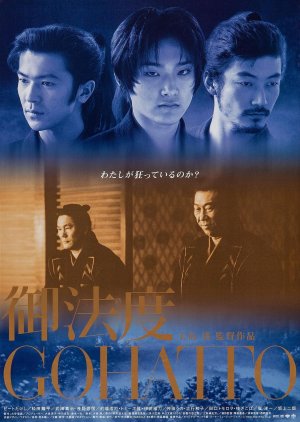
In terms of historical accuracy, Gohatto is right on the money for everything except the subject it's primarily dealing with.
In a way, it's modern-minded characters in a historical setting.
I won't give an entire Japanese history lesson here, but homosexuality was not fraught over as it is in the movie. For example, there is a lot of concern in the movie over who "swings that way" and who doesn't. In reality, shudo was considered a higher form of bonding and there was extremely little concern over who participated in such acts and who didn't. It's also important to note that sexuality was much less... fixed. It was not seen as such a solid concept as it is today.
Again, this could arguably be the intention of the director, handling a modern issue on a different platform.
Historical accuracy has never been huge for me, though. I do feel it's important to understand if something is or isn't.
A lot of this movie is left open to interpretation. If this is a big pet peeve of yours, I don't recommend this movie.
While artistically I understand why so many questions were left hanging in the air, a big part of me still wouldn't mind some filling in of the blanks.
Something I didn't hugely care for was that large chunks of time were "skipped over", explanations of what has occurred given textually. I just felt it didn't work for this film.
I do want to give due credit to the costume and set designs which were excellent. The swordsmanship was also well choreographed.
The music, on the other hand, just wasn't noteworthy.
The acting just didn't stand out to me. I felt the actors did their job and they did it well, but it wasn't anything more than that. It's difficult to tell if that is a reflection of their skills or a director's decision; I'm leaning towards the latter.
As a last little peeve, most of the actors keep a relatively flat affect the entire movie, especially Kano. While this can be chalked up to how samurai actually behaved at the time, my problem with it in this instance is that because so much of the plot is left up to how you interpret it, I was hoping for emotional cues to lead me in the right direction. So yes, I think the director made the right choice, but the selfish part of me wants to know what the characters actually felt.
I personally felt this movie was more about the corruption that goes with desire rather than homosexuality. Nonetheless, the director does a good job of presenting the issue in an interesting and relatively unique way.
Overall, it wasn't my favorite, but I do think Gohatto is worth watching.
Note: There's truly no sexually explicit scenes in this movie. There's only one that's even questionable. I do advise anyone who is squeamish of gore to proceed with caution, though.
Considerați utilă această recenzie?

One of the most noticeable indicators is how the Shinsen-gumi uniforms were completely off, as the Shinsen militia was famously known for their white-and-blue uniforms. Thus not including them in the movie was no mistake on the director's part. Another indicator is how we never really find out much about Kano's motives or his past and how inconclusive the ending is.
In fact, the whole movie is up for interpretation and not even watching it twice (which I did) would enable the audience to fully make sense of the events that happen throughout. In that sense, the movie tries too hard to be artistic or to transcend the setting and the time period into more abstract ideas and criticism pertaining to the modern Japanese society. What results is a messy string of scenes with characters we do not understand but somehow serve the director, Oshima's, overarching purpose.
The events could have been set in modern Japan for all we care and the story would have retained its flavor and may have even fared better (since the characters tote some very modern concepts of sexuality). That kind of flexibility is not necessarily so bad when the director is trying to get a certain message across, but the problem is when the characters are so simply caricatured.
In the end, I'm left with more questions than answers and I have no idea what I just watched. Is it art, a daring work that tackles eroticism? Is it a criticism of taboos (especially of the homosexual variety)? I don't know what 'Gohatto' is and I only have an inkling of an idea as to what it was supposed to stand for. Apparently, Oshima is no beginner when it comes to expressing what is, by society norms, considered taboo. Perhaps 'Gohatto' was yet another exploration of that taboo, which proved to be his last.
Back in December 1999, 'Gohatto' was a complete commercial success, but I wonder how many of the millions that flocked to see it left the cinema theaters with at least a basic understanding of what they've just seen.
Considerați utilă această recenzie?

Considerați utilă această recenzie?

What the actual Fuck?
just...WTFdidnt understood a thing. Maybe I'm just dumb.
................................................................................................................................................................................................................................................................................................................................................................................................................................................................................................................................
Considerați utilă această recenzie?

Draken Sano Shipper
2 oamenii au considerat această recenzie utilă
Această recenzie poate conține spoilere
So first off there's just something about the background music that was kinda creepy I don't know why! It was just a little weird I guess.So here's the low down, the main actor playing Kano was a little disappointing. That's the main reason for this not being a ten rating.
But there was something about the movie that felt very artistic and that's the part I loved. Gratefully pretty much everyone else was acting well, especially felt bad for Tojiro! But let's face it, all the sex with Kano was borderline non con or at least dub con.
It just felt like Kano let those men take advantage of him, even though he was so much more powerful than any of them ! But that's the thing I kinda loved about this story, it felt like despite being one of the best swordsmen in the school, Kano was mentally submissive - but I feel like that's also what causes his darkness.
I mean the guy basically admits that the only reason he joined the samurais was so he could kill. That means he had that darkness inside him all along, which he kept hidden underneath his beauty. I mean ffs poor Tojiro was clearly in love with him even when he finds out that Kano screwed him over, and pinned the murder on him, the second Kano said 'im sorry' he basically fell for it again and that's how Kano was able to kill him.
But then in the end, I feel like the Samurai who was telling the Captain the story of the two men, basically despite saying he was a homophobe, it was obvious he was also pretty much struggling with his own sexuality.
But what happened to Kano , they didn't show anything and it happens off screen but it's still impactful because basically Kano let the darkness take over and it drowned him too in the end.
I feel like it's also about the fact that giving anyone the power to kill is wrong because no matter how many Samurai codes you have, in the end, a person can still fool everyone and use the power of death to destroy.
And it's not really mentioned but it's obvious that Kano's story must have started from sexual abuse which turned him cold and murderous. It was like he couldn't believe that anyone could truly love him. And then he knew he was powerless to the men who were trying to get him in bed, so he wouldn't refuse them but ended up killing them after.
As for the sex scenes, they're pretty tame, but still serve the purpose to show us more about Kano and the other men.
Personally I also feel like because of whatever happened to him in the past, Kano was actually unable to feel love for anyone but kept saying things like 'i like you ' and literally even flirting with that one guy who the Captain appoints to take him to the Geisha place but Kano ends up not doing anything with the woman and instead acting like he wanted to sleep with that guy. Even though it eventually turns out that Kano doesn't have feelings for anyone, but uses these tricks to basically lure them to their deaths.
Considerați utilă această recenzie?

Această recenzie poate conține spoilere
The story of how destructive "male desire" can be ...
The main casting is very good but the direction makes the acting of the characters completely uninteresting. The film is very difficult to watch because the direction and editing are quite bad.From an artistic point of view, I find the film interesting but I didn't like execution, there was a huge lack of sensibility but from a writing point of view, the film is much deeper than it seems. The writing is very subversive. There are a lot of scenes that I didn't understand, many things are honesly so confusing too ...
Those things being said, I would like to share my own interpretation of the story:
Sozaburo Kano is treated throughout the film by the characters and even by the director as an object of desire, what he can say or think don't matter, he is a simple object at the mercy of male desire. The simple existence of Sozaburo, well beyond his physical appearance, provokes in those men more than obsession but a desire to possessed and corrupt him for their own plessure. He has no say, the desire of men only sees itself.
At no time does Sozaburo, although displaying a constant coldness and apathy throughout the film, ever express his consent. Sozaburo is a victim whose silence is taken as an acceptance of everything that all these men project into him.
We see him very clearly being harassed by this male desire, but he seems not to react at all. He knows his reaction won't change anything. And he seems to not even be suprised but more used to this treatment. It feels like he learned to play with apparences since probably very young, to not only be the victim somehow ... The psychology of this character is truly intriguing, and his story is deeply tragic.
And yet, towards the end of the film everything becomes clearer. Sozaburo Kano is a much more complex than it seems. He hides his real skills, he pretends to be a worse fighter than he is yet we grasp the fact that he tries to deceive the men around him by playing along the role that this "male desire" has forced and imposed on him, precisely we understand that his goal is to use that desire against them.
I see in Kano's actions a fatality, and a silent passivity that is already beginning to investigate revenge.
What is fascinating is that we understand that his agenda is to reverse this narrative of prey/predator spectrum that this male desire has forced on him.
His silence, his coldness seems to be the result of his life spent having to deal with trashy mens whoa bused him, to know how to adapt through the desire of these monsters. And the only purpose for his pain to him, and the repeated injustice of these crimes committed against him seems to be v'olence. He say it early on in the movie, he was there to k'll.
Who Sozaburo Kano loved? No one I think. I believe he has let all those rumours around just to be able to move silently in his plan, he was playing along, but not in their game but his own.
Soji and Kano might have a certain mutal understanding somehow but I also believe Soji loved Kano... I think he might have k'll Kano out of jealousy, because he realized Kano had feelings for Tashiro somehow ...
Kano might have caught some feelings for Tashiro even if he was using him, because Kano seems to be unable to fight Tashiro properly which I believe indicated his probable tourmoil about him. Tashiro forced himself on him for sure but somehow Kano feels something for him .. not sure why or what, but I do believe there is a mix of different feelings, hating him but also having some affection for him (a sort of stockholm sundrome).
Before k'lling him, he asked his forgiviness ... yes, he used this to be able to k'll him but he used truth to be able to fool him, that's why Tashiro believed his words.
Soji pretended he couldn't hear what Kano was saying to Tashiro, but I think he did. His instant pasisonate jealousy led him to k'll Kano.
"This sort of thing has happened before. Hearts inflamed by passion ... It must not happen again."
Considerați utilă această recenzie?








































